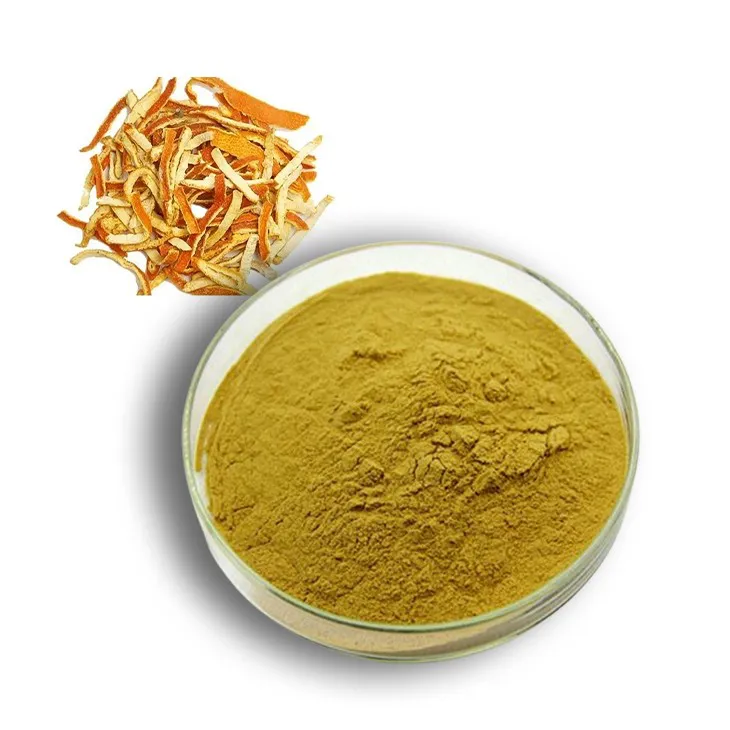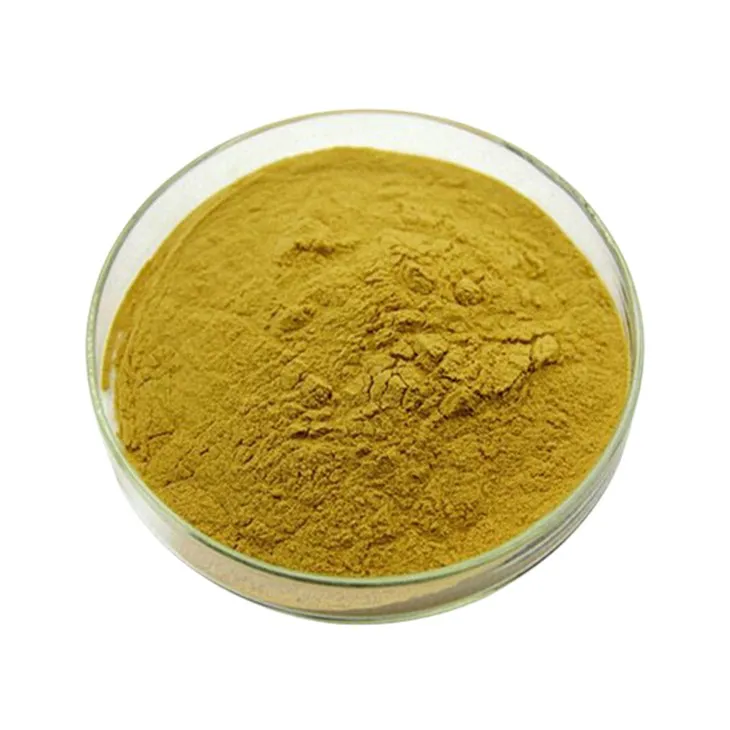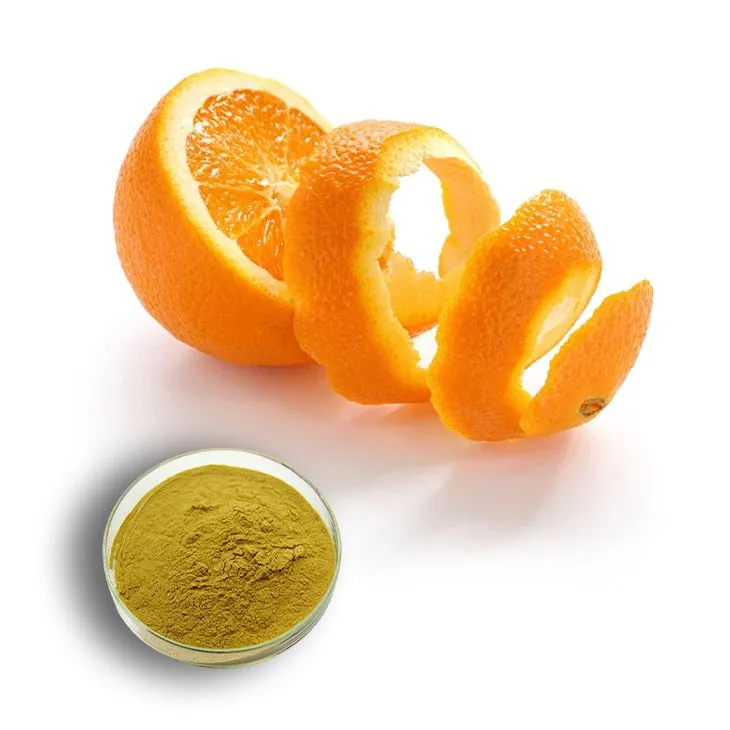- 0086-571-85302990
- sales@greenskybio.com
Heard of hesperidin? 5 Unexpected Health Benefits.
2024-11-13

Introduction
Hesperidin is a flavonoid that is predominantly found in citrus fruits. While many people may not be familiar with it, Hesperidin has been the subject of numerous scientific studies due to its potential health benefits. In this article, we will delve into five unexpected health benefits of Hesperidin.

1. Strong Antioxidant Properties
Antioxidants play a crucial role in maintaining good health. The human body is constantly exposed to free radicals, which are unstable molecules that can cause damage to cells, proteins, and DNA. This damage can lead to various health problems, including premature aging, cancer, and heart disease.
Hesperidin has been shown to possess strong antioxidant properties. It can scavenge free radicals in the body, neutralizing their harmful effects. By doing so, hesperidin helps to slow down the aging process. This is because free radicals are one of the main culprits behind the visible signs of aging, such as wrinkles, fine lines, and age spots.
Scientific studies have demonstrated that hesperidin can increase the activity of antioxidant enzymes in the body. These enzymes are responsible for breaking down free radicals and preventing them from causing damage. For example, a study published in the Journal of Agricultural and Food Chemistry found that hesperidin supplementation in rats led to an increase in the activity of superoxide dismutase (SOD), an important antioxidant enzyme.
In addition to its role in anti - aging, the antioxidant properties of hesperidin may also help to protect against chronic diseases. For instance, it may reduce the risk of cancer by preventing DNA damage caused by free radicals. It can also protect the heart by reducing oxidative stress, which is a major factor in the development of heart disease.

2. Improvement in Cardiovascular Health
Cardiovascular diseases are the leading cause of death worldwide. Therefore, any compound that can improve cardiovascular health is of great interest. Hesperidin has shown promising results in this regard.
One of the ways hesperidin benefits cardiovascular health is by reducing blood pressure. High blood pressure is a major risk factor for heart disease, stroke, and kidney disease. Studies have found that hesperidin can relax blood vessels, which in turn leads to a reduction in blood pressure. For example, a clinical trial involving hypertensive patients showed that supplementation with hesperidin led to a significant decrease in both systolic and diastolic blood pressure.
Another important aspect of cardiovascular health is cholesterol levels. Hesperidin can also have a positive impact on cholesterol metabolism. It has been shown to reduce LDL (low - density lipoprotein) cholesterol, also known as "bad" cholesterol, while increasing HDL (high - density lipoprotein) cholesterol, or "good" cholesterol. This balance is crucial for maintaining a healthy cardiovascular system.
A meta - analysis of several studies on hesperidin and cardiovascular health found that regular consumption of hesperidin - rich foods or supplements was associated with a reduced risk of cardiovascular events. This includes heart attacks, strokes, and other related conditions.
Moreover, hesperidin may also help to prevent the formation of blood clots. Blood clots can block blood vessels and lead to serious health problems, such as heart attacks and strokes. By inhibiting platelet aggregation, hesperidin can reduce the risk of clot formation and improve overall cardiovascular function.

3. Enhancement of the Immune System
A strong immune system is essential for protecting the body against various diseases. Hesperidin can play a role in enhancing the immune system in several ways.
Firstly, it can stimulate the production of immune cells. White blood cells are the body's main defense against pathogens. Hesperidin has been shown to increase the production of certain types of white blood cells, such as lymphocytes and neutrophils. These cells are responsible for identifying and destroying foreign invaders, such as bacteria, viruses, and fungi.
- For example, in a study on mice, hesperidin supplementation led to an increase in the number of lymphocytes in the spleen, an important organ of the immune system.
- Another study found that hesperidin could enhance the phagocytic activity of neutrophils, which means that these cells were more effective at engulfing and destroying pathogens.
Secondly, hesperidin can modulate the immune response. It can help to balance the immune system, preventing it from overreacting or underreacting. An overactive immune system can lead to autoimmune diseases, where the body attacks its own cells. On the other hand, an underactive immune system makes the body more susceptible to infections.
- Hesperidin has been shown to regulate the production of cytokines, which are signaling molecules that play a key role in the immune response. By modulating cytokine production, hesperidin can help to keep the immune system in check.
Overall, by enhancing the immune system, hesperidin can help the body to resist diseases more effectively, from common colds to more serious infections.

4. Anti - Inflammatory Effects
Inflammation is a natural response of the body to injury or infection. However, chronic inflammation can be harmful and is associated with many diseases, such as arthritis, diabetes, and heart disease.
Hesperidin has significant anti - inflammatory effects. It can inhibit the production of inflammatory mediators, such as cytokines, prostaglandins, and nitric oxide. These mediators are involved in the inflammatory process and can cause pain, swelling, and redness.
- For example, in a study on patients with rheumatoid arthritis, hesperidin supplementation was found to reduce the levels of inflammatory cytokines in the blood, leading to a decrease in joint pain and stiffness.
- In another study on animals with induced inflammation, hesperidin was shown to reduce the production of prostaglandins, which are lipid - based inflammatory mediators.
The anti - inflammatory effects of hesperidin are also beneficial for the skin. It can help to soothe skin inflammations, such as acne, eczema, and psoriasis. By reducing inflammation, hesperidin can improve the appearance of the skin and promote its overall health.
In addition, hesperidin may play a role in preventing chronic inflammatory diseases. By reducing chronic inflammation in the body, it can lower the risk of developing diseases such as diabetes, heart disease, and certain types of cancer.
5. Improvement in Blood Circulation
Good blood circulation is essential for delivering oxygen and nutrients to all parts of the body and removing waste products. Hesperidin can contribute to improved blood circulation in several ways.
Firstly, as mentioned earlier, it can relax blood vessels. When blood vessels are relaxed, blood can flow more easily through them. This is especially important for people with conditions such as peripheral artery disease, where blood flow to the extremities is restricted.
- Hesperidin can also improve the function of the endothelium, which is the inner lining of blood vessels. A healthy endothelium is necessary for proper blood flow and vascular function.
Secondly, hesperidin can prevent the oxidation of LDL cholesterol in the blood vessels. Oxidized LDL cholesterol can accumulate in the blood vessels and form plaques, which can narrow the arteries and impede blood flow. By preventing this oxidation, hesperidin helps to keep the blood vessels clean and open.
- Finally, hesperidin may also enhance the production of nitric oxide in the blood vessels. Nitric oxide is a gas that helps to dilate blood vessels and improve blood flow.
By improving blood circulation, hesperidin can contribute to overall well - being. It can reduce the risk of developing circulatory problems, such as varicose veins, deep vein thrombosis, and poor wound healing.
Conclusion
Hesperidin, a flavonoid found in citrus fruits, has many unexpected health benefits. Its strong antioxidant properties, ability to improve cardiovascular health, enhancement of the immune system, anti - inflammatory effects, and improvement in blood circulation make it a compound worthy of further study and consideration.
While more research is needed to fully understand the mechanisms behind these benefits and to determine the optimal dosage for supplementation, incorporating hesperidin - rich foods, such as oranges, lemons, and grapefruits, into the diet can be a simple and natural way to potentially reap these health benefits.
FAQ:
What is Hesperidin?
Hesperidin is a flavonoid mainly found in citrus fruits.
How does Hesperidin slow down the aging process?
Hesperidin has strong antioxidant properties. These antioxidants combat free radicals in the body, which in turn helps to slow down the aging process.
Can Hesperidin really reduce blood pressure?
Yes, Hesperidin may improve cardiovascular health by reducing blood pressure as well as cholesterol levels.
How does Hesperidin enhance the immune system?
Hesperidin helps the body to resist diseases more effectively, thereby enhancing the immune system. However, the exact mechanisms by which it does this are still being studied.
What kind of inflammations can Hesperidin relieve?
Hesperidin has anti - inflammatory effects which are beneficial for relieving various inflammations in the body. But specific inflammations may vary from person to person and more research is needed to identify all the types it can relieve.
Related literature
- Title: The Role of Hesperidin in Cardiovascular Health"
- Title: "Hesperidin: A Promising Antioxidant in Citrus Fruits"
- Title: "Hesperidin and Immune Function: Current Research"
- ▶ Hesperidin
- ▶ citrus bioflavonoids
- ▶ plant extract
- ▶ lycopene
- ▶ Diosmin
- ▶ Grape seed extract
- ▶ Sea buckthorn Juice Powder
- ▶ Beetroot powder
- ▶ Hops Extract
- ▶ Artichoke Extract
- ▶ Reishi mushroom extract
- ▶ Astaxanthin
- ▶ Green Tea Extract
- ▶ Curcumin Extract
- ▶ Horse Chestnut Extract
- ▶ Other Problems
- ▶ Boswellia Serrata Extract
- ▶ Resveratrol Extract
- ▶ Marigold Extract
- ▶ Grape Leaf Extract
- ▶ blog3
- ▶ blog4
- ▶ blog5
-
Organic Tongkat Ali extract powder factory.
2024-11-13
-
How to make powder with ashwagandha extract.
2024-11-13
-
Rosehip extract manufacturers from China.
2024-11-13
-
The best cat's claw extract in nature.
2024-11-13
-
Chinese Dandelion Leaf Extract Suppliers.
2024-11-13
-
Passionflower Extract
2024-11-13
-
Maca Extract
2024-11-13
-
Lavender Extract
2024-11-13
-
Giant Knotweed Extract
2024-11-13
-
Agaricus Blazei Extract
2024-11-13
-
Carrageenan Extract Powder
2024-11-13
-
Avocado Extract Powder
2024-11-13
-
Soy Extract
2024-11-13
-
Sophora Flavescens Root Extract
2024-11-13
-
Fig Extract
2024-11-13





















